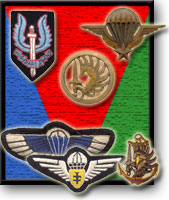General Staff Security Unit
Up until recent years, the IDF High Command - the General Staff members - lacked a professional security detail, which can protect them during everyday activities such as attending civilian events or visiting high risk areas such as the Occupied Territories and the Israel-Lebanon border.
One partial exception was the residence of the Chief of General Staff, which were protected by instructors from the IDF Counter Terror Warfare School, an activity known as “White House”. In 2001, following the assassination of the Israeli Tourism Minister by Palestinian terrorists, the IDF decided it needed a professional protection unit, equivalent to the Israeli General Security Service (SHABACH) Security Unit, and formed the General Staff Security Unit
The General Staff Security Unit primary missions are
-
Protecting the Chief of General Staff.
-
Protecting other General Staff members according to need – the extent of protection varies according to the level of threat - some generals receive 24/7 protection, other receive protection when entering high risk areas
-
Protecting IDF representatives during overseas visits
-
Protecting foreign high ranking military representatives during visits to Israel
The new unit was partially based on a Northern Command reserve SF unit which was formed in the mid 1980’s, following the IDF increased involvement in the South Lebanon, in order to project high ranking officers which entered Lebanon.
After the IDF withdrawal from South Lebanon in May 2000, there was no longer a need for the unit and it was disbanded. When the new Security Unit was formed in 2001, many of the former Northern Command reserve SF unit personnel were reassigned under it in a reserve capacity and some were even reenlisted into active duty.
In its first years the unit had considerable growing pains as the unit’s formation and goals weren’t properly laid out. There were several reports of misconduct such as usage of the unit’s security vehicles for private purposes and exaggerated expenses. Another criticism was that the unit’s size was too big for its missions. Eventually, the Military Police conducted an investigation into the unit and its first CO was forced to resign. The unit was also downsized in its manpower.
Unlike most of the IDF SF units, the Security Unit is not made out of mandatory service personnel but is rather based on career officers. The unit also has large reserve force which can be called for duty when needed. Most of the unit’s operators are graduates of various Israeli government security units within such organisation as the SHABACH and the Israeli Airports Authority. There is also a preference for officers and former SF operators.
New operators pass an extensive course which includes CT, dignitary protection, Krav Maga and tactical driving. The course is conducted. with assistance from the IDF Counter Terror Warfare School and the SHABACH Security Unit. As the operators might sometimes engage other military forces, they are also trained and equipped to handle limited military style warfare. The unit also works in close cooperation with Oket’z in missions which require canine assistance such as explosives sniffing.
The Security Unit enjoys a generous budget which allows it procure the latest in weaponry and gear. It also has large pool of marked and unmarked military and civilian vehicles. The operators’ standard issue weapons are IDF homemade Shorty CAR15/M4A1 and Glock handguns. All of the unit’s operators, regardless of their previous military rank, receive the rank of captain. In order to better blend in their surroundings, the unit’s operators usually wear plain clothes when securing civilian events and wear uniforms when inside military bases or facilities. As with other specialized SF units, the Security Unit also acts as a school and passes VIP protection techniques classes to various IDF SF units according to need.


